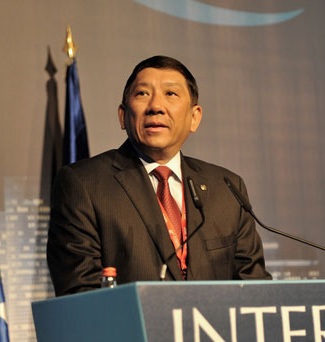“[Eighty] per cent of crime committed online is now connected to organized gangs operating across borders. Criminal gangs now find that transnational and cybercrime are far more rewarding and profitable than other riskier forms of making money.” — INTERPOL President Khoo Boon Hui at 41st European Regional Conference held in Tel Aviv, citing study from London Metropolitan University, May 8, 2012

EDITOR’S NOTE: HYIPs, autosurfs, money-cyclers, and other “programs” are part of the cyber menace, which increasingly is being advanced by criminal gang members who reach across national borders and line their pockets with money stolen from their targets.
In June 2011, U.S. Attorney General Eric Holder described the amount of money being stolen online as “staggering.”
The thefts, Holder said, have “the potential to threaten not only the security of our nation — but the integrity of our government, the stability of our economy, and the safety of our people.”
In Tel Aviv yesterday, INTERPOL cited some truly alarming numbers . . .
How big is the criminal menace becoming in the age of cross-border fraud on the Internet?
In jaw-dropping remarks yesterday in Israel, INTERPOL President Khoo Boon Hui said Malaysian police last month arrested 137 “gang members” from China and Taiwan who were running an online gambling scam that had gathered the staggering sum of $1.3 billion in “profits.” (NOTE: This sum is quoted in U.S. dollars.)
The scammers, Hui said, were part of a cross-border criminal syndicate that was operating from “six luxury homes equipped with call centres, computers and even training rooms in a gated community which was also home to a former prime minister.”
If that weren’t enough, Malaysian police — just two days after taking down that scam — encountered another one that had resulted in criminal profits in the billions. The second scam again involved gang members from China and Taiwan. It resulted in 83 arrests, Hui said.
“They cheated victims in China and Taiwan through online scams involving a range of modus operandi from impersonating the authorities to phoney credit card and bank charges,” Hui said. “They were on the verge of fleeing the country, having closed down their operational base and some had even made it to the airport where they were detained in the nick of time. They had been in Malaysia for just eight months when they were arrested.”
Early information suggests that the fraud “originated from Macau and had operated from other countries such as Cambodia, Indonesia, Philippines and Thailand,” Hui said.
The story of the arrests, however, appears to have an ending that could be described as unfinished. Indeed, Hui said he grew “perturbed” when he found out that the subjects of the arrests were deported because “thousands of victims were out of Malaysian Police jurisdiction.”
“I was perturbed by this course of action and asked the Malaysian Police Chief for more details when I met him last Friday,” Hui said. “It turned out that though the two syndicates were unknown to each other, they were controlled by a common Taiwanese boss. This was why the second syndicate had been alerted to pack up. Fortunately, the Taiwanese Police, which as we all know is not an INTERPOL member, was able to fully cooperate with its Chinese and Malaysian counterparts and had alerted them of what was happening from its own close monitoring. The Malaysian Police chief was confident that the gang members would get their just dues back in their homeland.”
In relating the story of scammers who allegedly stole billions of dollars while operating inside the borders of another nation, Hui said the incident highlights some of the problems law enforcement encounters in the age of the Internet.
“This case illustrates how organized crime is now able to recruit members from countries without diplomatic ties to commit crimes overseas operating from temporary safe bases in third countries equipped with the latest technology,” Hui said. “It also shows that there are links between syndicates that operate scams and those which promote illegal betting and presumably match fixing using sophisticated MOs. In this case, exceptional international police cooperation within the region thwarted them.”
And cybercrime hardly is limited to Asia, Hui said, noting that the menace and its economic costs come in more than one form.
“Here in Israel alone, a reported number of over 1,000 cyber?attacks take place every minute,” Hui said. “Experts have estimated that the cost of cybercrime is larger than the combined costs of cocaine, marijuana and heroin trafficking. In Europe, the cost of cybercrime has apparently reached 750 billion Euros [US$971 billion] a year. Likewise, we have seen global financial institutions suffer from major cyber?attacks on their networks and servers with US banks purportedly losing $900 million to bank robbers but $12 billion to cyber criminals last year.”
Comments
One response to “INTERPOL PRESIDENT: Transnational Criminals Working For ‘Common . . . Boss’ In Asia Gathered Billions; Suspects Caught At Airport In ‘Nick Of Time’; Cybercrime Costs In Europe Now Approaching $1 TRILLION A Year; U.S. Banks Lost $12 Billion To Cyber Criminals In 2011”
“Experts have estimated that the cost of cybercrime is larger than the combined costs of cocaine, marijuana and heroin trafficking.”
Which is what may people have been trying to warn law enforcement and the public for years.
Good to see it being taken seriously. Maybe some of the ponzi pushers will take note and realise that they are involved in crimes, not innocent money games.